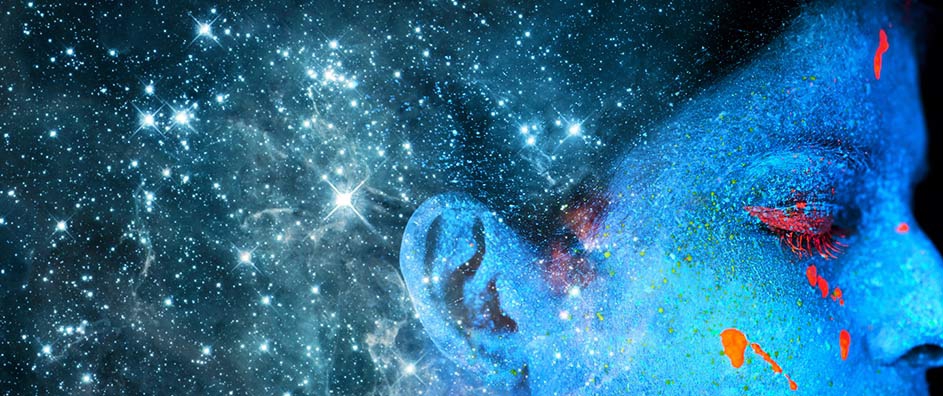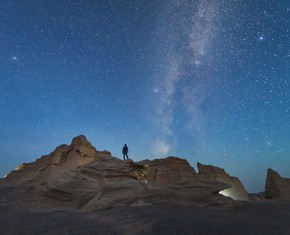The views expressed in our content reflect individual perspectives and do not represent the authoritative views of the Baha'i Faith.
What I cannot create, I do not understand. – Richard Feynman
While much has been learned, it is clear that we are still nowhere near explaining the origin of life. – Christian de Duve, Nobel Prize-winning biochemist
…the origin of life remains a deep mystery. There are no lack of theories, of course, but the divergence of opinion among scientists on this topic is probably greater than for any other topic in biology. The essential problem in explaining how life arose is that even the simplest living things are stupendously complex. The replicative machinery of life is based on the DNA molecule, which is itself as structurally complicated and intricately arranged as an automobile assembly line. If replication requires such a high threshold of complexity in the first place how can any replicative system have arisen spontaneously? – theoretical physicist Paul Davies, Cosmic Blueprint: New Discoveries in Nature’s Creative Ability to Order the Universe, p. 115.
The simplest bacterium is so damn complicated from the point of a chemist that it is almost impossible to imagine how it happened. – Harold Klein, Chairman of the National Academy of Sciences committee for the review of origin of life research.
General consensus rarely exists on any of the big scientific questions, but the topic of the origin of life brings scientists into complete and unanimous accord—the scientific community universally agrees that they simply do not know how life began:
The origin of life on Earth is still a mystery, one of the greatest mysteries in science today. We are surrounded by myriads of life forms―each leaf of a tree in a forest contains billions of living cells, our body contains huge numbers of active microorganisms, we people keep living and growing, incessantly―and we do not yet know how life came about on our planet. Our ignorance about the origin of life is profound―not just some simple missing mechanistic detail. We do not know how the genetic code came about, we do not understand yet how the specific sequences of proteins or nucleic acids came about in multiple identical copies, we do not have a precise idea about the structure and functioning of the first proto-cells. This ignorance stems not only from our experimental difficulties with prebiotic chemistry, but is also conceptual, as we are not yet able to conceive on paper how all these things came about. – Kepa Ruiz-Mirazo, “Open questions on the origin of life: introduction to the special issue,” Origins of Life and Evolution of Biospheres 40 (No. 4-5, 2010), p. 353.
We may never know the answer to this complex, baffling, open question. We may never unlock the mysterious mechanisms that transform the inanimate into the animate. We cannot create life, so we many never fully understand it.
This mystery, however, does give us one advantage: a sense of awe and wonder when we contemplate the origins of life. It also gives even the most erudite and accomplished scientists a window into our humble human limitations. We’re just humans; not gods. We can only live life and appreciate life and marvel at life—we cannot create it:
…from every natural composition a living thing comes into existence, but from a chance composition no living thing will appear… This is the answer to the implicit question that might arise, that since these beings come into existence through the composition and combination of these elements, then can we not also gather together and combine the very same elements and thus create a living thing? This idea is mistaken; for the original composition is a divine composition, and the combination is produced by God according to the natural order… But a composition made by man produces nothing because man cannot create life. – Abdu’l-Baha, Some Answered Questions, newly revised edition, p. 209.
The Baha’i teachings say that this realization should give us an inkling of our inadequacy:
…the mesh of divine destiny exceedeth the vastest of mortal conceptions, and the dart of His decree transcendeth the boldest of human designs. – Baha’u’llah, The Book of Certitude, p. 250.
So in some ways, the realization that we can’t know everything, that our “mortal conceptions” and advanced scientific accomplishments pale when compared to the unfathomable wonders of creation itself, can also give us a new realization: that we humans do have the power to transcend nature and its laws. We have the power to ask how life began, to investigate the daunting question even though we haven’t yet found the answer, and may never find it. We have the power to rise above the natural physical constraints of everything mineral, plant and animal. We have the power to cogitate, contemplate and meditate on life’s creation:
Man is intelligent, instinctively and consciously intelligent; nature is not. Man is fortified with memory; nature does not possess it. Man is the discoverer of the mysteries of nature; nature is not conscious of those mysteries herself. It is evident, therefore, that man is dual in aspect: as an animal he is subject to nature, but in his spiritual or conscious being he transcends the world of material existence. His spiritual powers, being nobler and higher, possess virtues of which nature intrinsically has no evidence; therefore, they triumph over natural conditions. These ideal virtues or powers in man surpass or surround nature, comprehend natural laws and phenomena, penetrate the mysteries of the unknown and invisible and bring them forth into the realm of the known and visible. All the existing arts and sciences were once hidden secrets of nature. – Abdu’l-Baha, The Promulgation of Universal Peace, p. 81.
“…man is dual in aspect,” the Baha’i teachings say, “as an animal he is subject to nature, but in his spiritual or conscious being he transcends the world of material existence.”
That wisdom about our innate duality tells us that we have one foot in the natural world and another in the spiritual realm. We have bodies, and we have souls. We are mammals, and yet we can rise above the material and aspire to the spiritual.
Next: Where’s the Intelligence Behind Intelligent Design?
















Comments
Sign in or create an account
Continue with Googleor